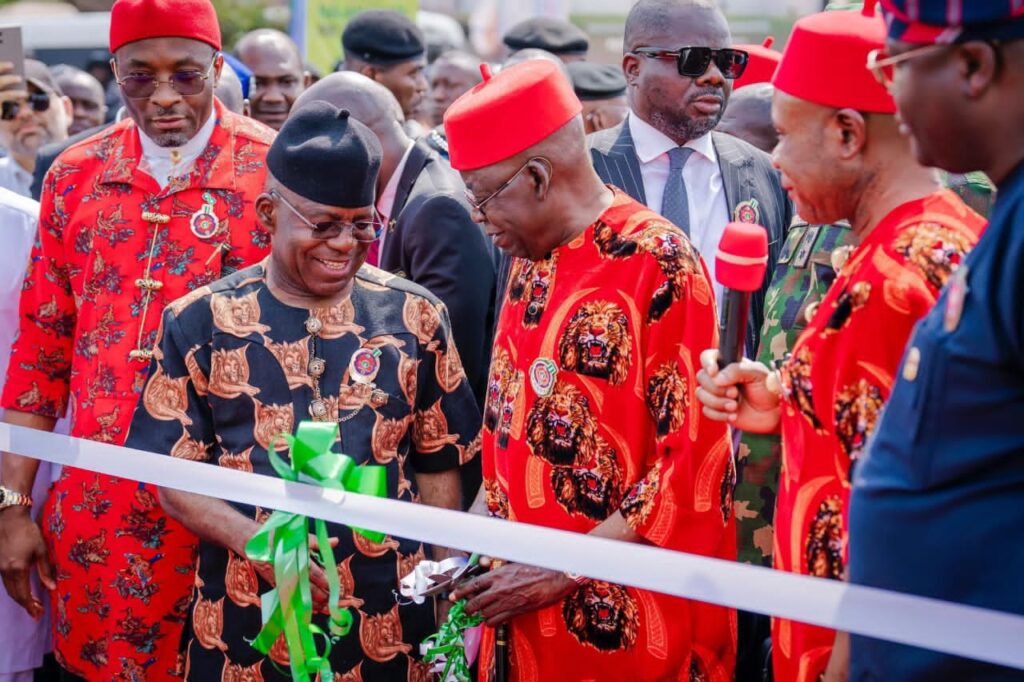
In Nigeria’s current political climate, it is becoming increasingly clear that some state governors are deliberately blackmailing President Bola Ahmed Tinubu. By refusing to acknowledge the gains of his policy reforms particularly the removal of fuel subsidy they prefer that Tinubu alone shoulders the burden of public anger and hardship, while they quietly enjoy the windfall of unprecedented federal allocations.
These governors sit on local government funds, collect intervention packages, and receive allocations that have quadrupled in size. Yet, instead of crediting the reforms that made this possible, they pretend their expanded financial capacity is the result of their own ingenuity.
Governor Alex Otti of Abia State stands out as a prime example of this subtle sabotage.
During the administration of former Governor Okezie Ikpeazu, Abia’s monthly federal allocation hovered between ₦2 billion and ₦4 billion. Today, courtesy of Tinubu’s subsidy removal and broader fiscal reforms, Otti receives between ₦35 billion and ₦40 billion monthly. That is a tenfold increase.
With such unprecedented revenue, one would expect robust social safety nets, targeted interventions to cushion the effects of inflation, and significant savings for long-term stability. Instead, Otti has opted for heavy taxation. From market women to hawkers, the poor in Abia are squeezed daily with levies and inflated ticket fees even as they struggle with soaring food and fuel prices. This is not reform; it is exploitation.
What makes Otti’s posture even more troubling is his refusal to acknowledge that Tinubu’s reforms are the foundation of his fiscal strength. While other governors have credited the president, Otti spins a false narrative.
In Anambra, Governor Charles Soludo an opposition figure openly admitted that Tinubu’s reforms strengthened his capacity for infrastructure delivery. Adding to that, Imo Governor Hope Uzodinma has repeatedly credited Abuja’s improved inflows for the turnaround in projects and welfare programs, also Enugu Governor Peter Mbah has publicly celebrated the reforms as enablers of his government’s infrastructure drive.
Yet, only Alex Otti of Abia and Abba Kabir Yusuf of Kano have consistently refused to acknowledge Tinubu’s reforms as enablers of their infrastructural strides. Instead, Otti arrogantly told journalists during a media chat that his government’s financial capacity was a product of “Otumokpo” (magical ingenuity). That claim was not just misleading; it was a calculated attempt to rob Tinubu of credit while presenting himself as a lone miracle worker.
This dishonesty is not new. Recall that in early 2023, Otti resisted displaying President Tinubu’s portraits in Abia government offices, only relenting after public backlash. That symbolic defiance foreshadowed his current strategy: package federal reimbursements for federal road projects like the Port Harcourt Road, Omenuko Bridge, Ohafia–Arochukwu Road, and the Umuahia–Uzuakoli–Akara–Alayi Highway as though they were purely his achievements. These projects will eventually be refunded by the federal government, yet Otti parades them as evidence of his “magic touch.”
Just a few months ago, President Tinubu attended a special National Economic Council (NEC) meeting where he personally appealed to governors to “water the grassroots” and cushion the harsh impact of institutional reforms on ordinary Nigerians. Many states have responded with grassroots-focused interventions.
History offers a painful warning. During President Goodluck Jonathan’s tenure, governors initially agreed to subsidy removal, but some, led by Babatunde Fashola, later betrayed him denying the policy and joining opposition forces to discredit his government. That sabotage weaponized public sentiment and ultimately weakened Jonathan’s reelection chances.
Tinubu must therefore be cautious. Otti’s silence on federal contributions to his success is not accidental, it is a calculated opposition strategy to isolate the president as the villain of hardship while Otti emerges as a savior in Abia.
Even beyond his refusal to acknowledge Tinubu, Otti’s governance record raises troubling questions:
1.) Operating from his village: Nearly three years into office, Otti continues to superintend over the affairs of Abia from his Umuehim Nvosi village home, despite presidential admonition. To justify this controversial arrangement, he demolished the existing Government House in Umuahia under the guise of building a new one. In reality, there is currently no Government House; instead, Otti operates from his private residence while over ₦40 billion has reportedly been sunk into this questionable setup, leaving citizens to ask what becomes of the state funds already spent on government facilities in his village house. Are they still Abia state government property?
2.) Pension and gratuity neglect: Abia remains the only state yet to fully pay arrears of pensions owed by past administrations, despite receiving an average of ₦38 billion monthly. Gratuity payments, amounting to ₦71 billion dating back to 2003, remain untouched.
3.) Union crisis: The state is currently at loggerheads with the Nigeria Union of Pensioners, Abia chapter, as Otti allegedly attempts to coerce them into forfeiting outstanding gratuities. By contrast, Imo recently cleared ₦70 billion in arrears, Zamfara spent ₦13.6 billion to settle obligations from 2009 to 2023, Katsina cleared ₦24 billion from 2012 to 2023, and Anambra, under Soludo, paid off the ₦7 billion left behind by Willie Obiano.
Meanwhile, in Abia, even the new ₦70,000 minimum wage has not been fully implemented across all local government units, more than two years after its introduction.
Otti cannot continue to bask in the glory of swollen federal allocations while refusing to admit their source. He cannot feast on Tinubu’s reforms while shifting the burden of public anger to the president.
This is not just dishonesty; it is sabotage.
Governor Otti’s actions raise a fundamental question: Is he deliberately sabotaging President Tinubu? His refusal to acknowledge federal reforms, his penchant for burdening the poor, and his symbolic antagonism all point to a carefully calculated strategy.
Tinubu should take note: not all governors presenting themselves as reformers are allies. Some are quietly setting him up as the scapegoat of Nigeria’s hardship, while they bask in unearned glory.
Uche Aguoru
Public Affairs Analyst

